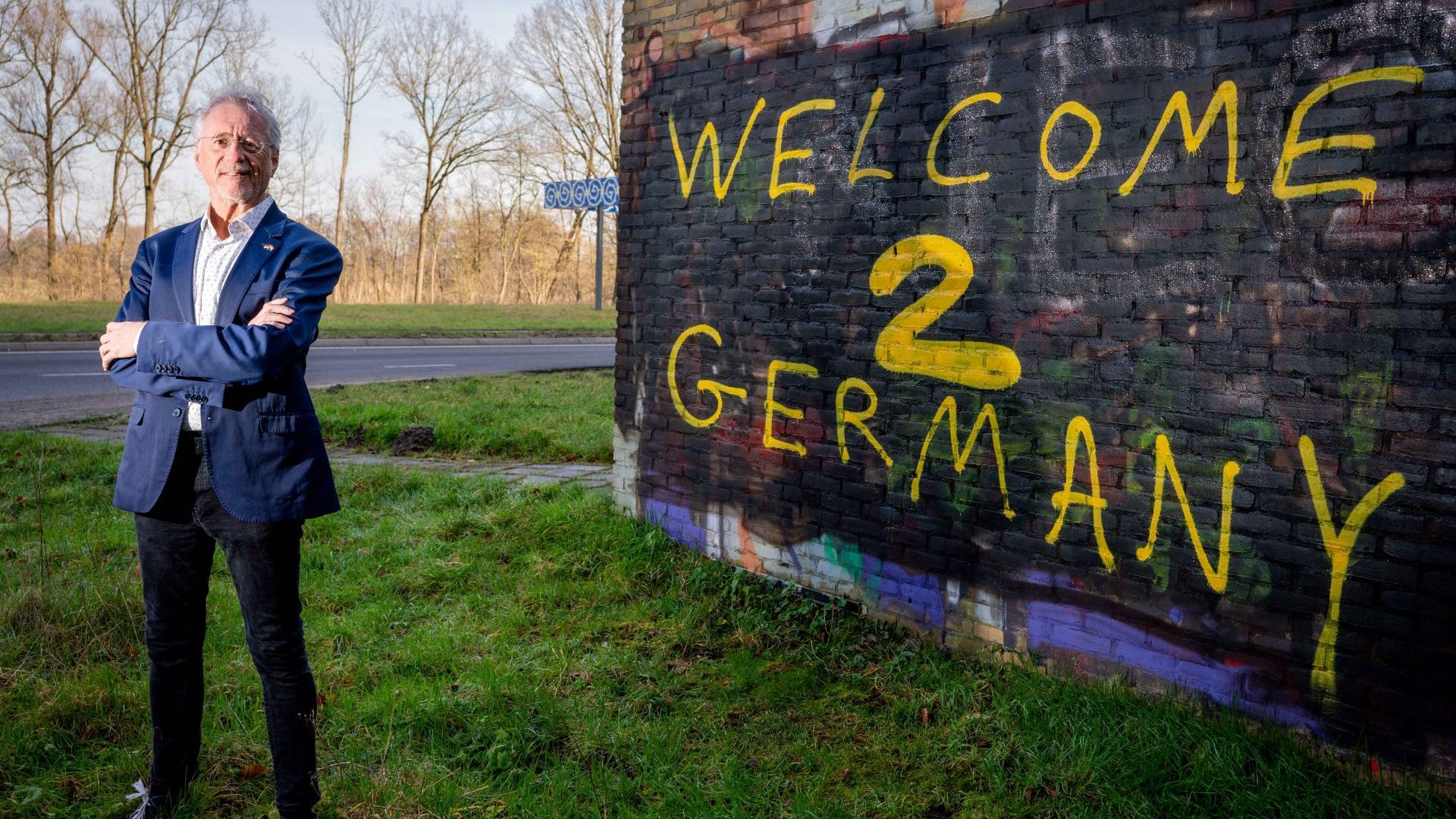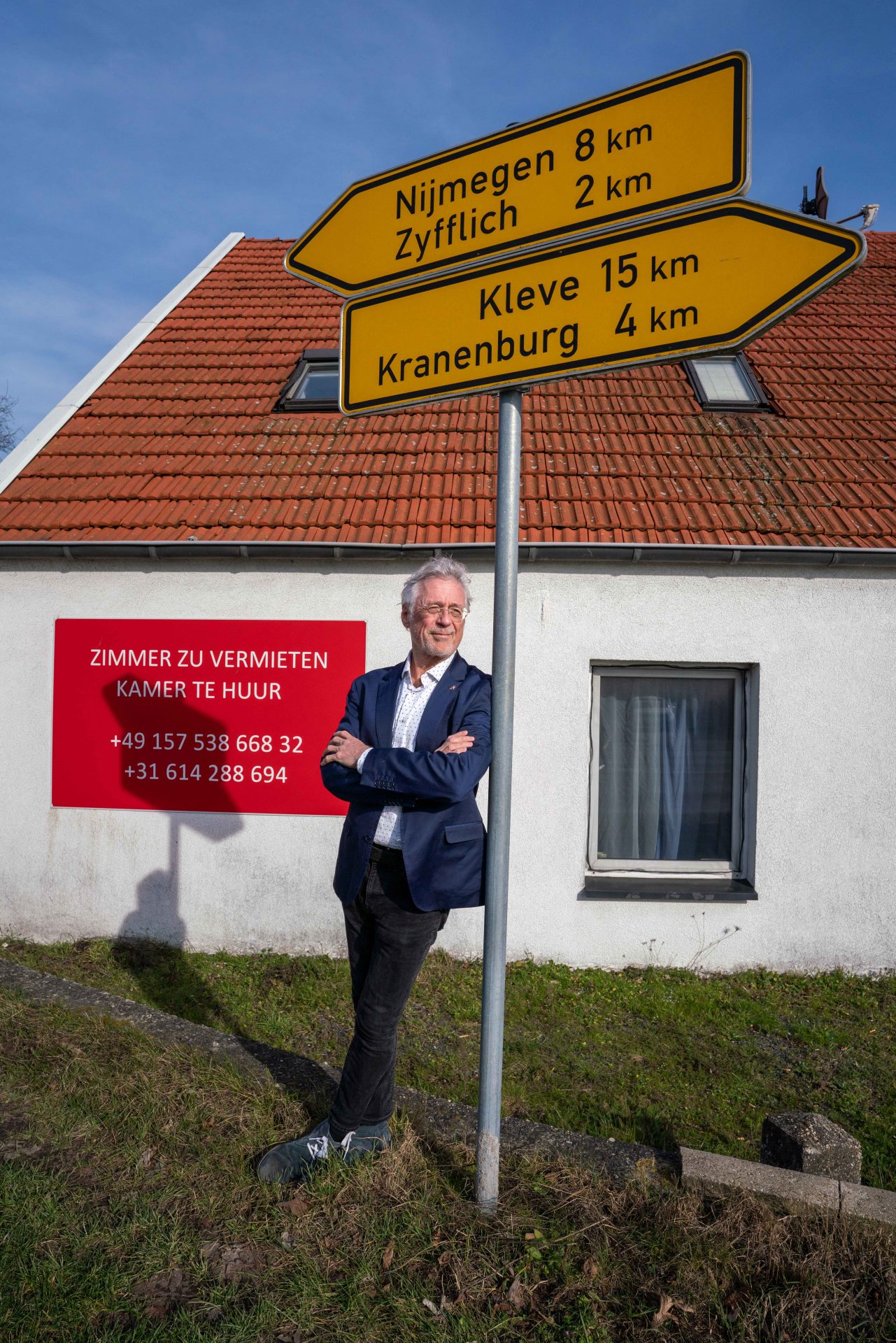Don’t forget to look on the other side of the border too
-
 Paul Sars. Foto: Erik van 't Hullenaar
Paul Sars. Foto: Erik van 't Hullenaar
Germany is less than 10 kilometres from the University campus. Yet most Nijmegen residents rarely cross the border – their gaze is limited to the Dutch side. Which is a shame, says professor of German Language and Culture Paul Sars. Four reasons to become a border hopper.
His mother used to read to him at night, poems by Goethe, Hölderlin, Rilke. Not that little Paul understood what they were about, but he loved the rhythm and sound of the sentences. ‘That’s where my love for the German language began,’ he says.
This article is part of the newest Vox paper edition. Starting this week, it’ll be available all over campus. In this edition, we’re looking for both similarities and differences between German and Dutch citizens. Or: does the stereotypical German even exist?
Paul Sars is a true ambassador of German language and culture, also outside Radboud University: he is quite literally the ambassador of the Rijn-Waal Euregio, which is intended to promote cooperation between Germany and the Netherlands. The Netherlands only has two professors of German Language and Culture, Sars being one of them (the other one works in Utrecht). He often sits down to discuss things with the German ambassador.
‘I grew up on the border in Roermond. We had a neighbour who sometimes went to Mönchengladbach to buy sandwiches, and I was allowed to go along. It was a huge adventure, like going on a trip around the world.’ And when Germans came to Roermond in their big cars, he would run towards them, hoping they would ask for directions. Just so he could speak German to them.
These days, he still does the same. As a young academic, he even ventured into writing poetry in his favourite language, having studied German in Nijmegen and Philosophy in Munich. Nowadays he sticks to academic publications and information leaflets for schools, companies, students, and politicians. And he has as many Germans as Dutch in his team.
‘A neighbour sometimes went to Mönchengladbach to buy sandwiches, I was allowed to go along’
He is genuinely surprised that so many Dutch people, especially residents of the border region, live with their backs to their eastern neighbours. Four areas in which we are missing out on opportunities, according to Paul Sars.
1: The language
The language! German has thousands more words than Dutch. ‘It’s an incredibly beautiful language. So rich! German has so many speakers and, as a Germanic language, it is also influenced by Slavic, Romance, and Nordic culture. Germany has nine neighbouring countries, making German a hodgepodge, the language of central Europe. The Swiss and Austrians have enriched the language, and because of the many immigrants – Germany is a Zuwanderungsland (country of immigration) – new words are being added all the time.’
If you master the language, an entire world opens up. Just think of the great thinkers and poets that Sars’ mother read aloud to him. ‘The Netherlands only boasts one great philosopher, Spinoza, and he was a Portuguese-Spanish Jew. Germany has a philosophical tradition. German culture has been shaped by great thinkers. The poets inspired the philosophers, and vice versa. Heidegger once said that his death analysis was based on the work of the poet Rilke.’
Sars calls German a unifying language. The country was divided for a long time – in 1600 it still consisted of 400 different city-states – but the language created unity. It was only after the Berlin Wall fell in 1989 that a safe political unity emerged for the first time.
2: The economy
Germany is the Netherlands’ largest trading partner, but it could play a much bigger role. ‘Look at places like Duisburg, Düsseldorf, or Essen. These cities are home to millions of people, and they are closer than Amsterdam. They are major economic centres, with a huge potential, not only in terms of labour force, but also in terms of jobs.’
You would think any self-respecting company would open a branch across the border to take advantage of that market. But they don’t. ‘Yes, there are regulatory differences, but this isn’t the real reason. The issue lies with the cooperation itself, and the communication. Germans are incredibly good at analysing problems; they want to have everything figured out in advance. Whereas we Dutch say: We’ll see where the ship runs aground, a German says: There’s no way I’m going to board a ship that might run aground.’
‘In the Netherlands, we are quick to ask: how much profit will this yield?’
According to Sars, this means that we need better education, a helpdesk where you can get advice on how Germans think and what makes Dutch people tick. In 2019, he was asked by the Province of Gelderland to draw up a plan for a Netherlands-Germany Border Institute. It had to be a physical building, with people in it who understand both cultures and could therefore break down barriers. Cooperation in lower and higher education, technology, and trade was to be encouraged.
‘But the plan foundered due to the expense. In the Netherlands, we are quick to ask: how much profit will this yield? Well, it takes 10 to 20 years for this kind of cooperation to bear fruit. The payoff lies in learning from each other’s best practices. If a German and a Dutch school in the border region manage to merge, you can show other schools: Look, it works; this is how you can do it too.’
3: Education
The Netherlands has four universities on the German border: Groningen, Enschede, Maastricht, and Nijmegen. Why don’t they pull together? Why don’t they make it easier for German students to study in the Netherlands and vice versa? Why are German and Dutch students seen as ‘different’? You should throw things open, thinks Paul Sars. Set the same entry requirements and create the same scholarship opportunities for both nationalities. And create joint degrees, study programmes in which universities from two different countries jointly present a programme, like the Master’s programme in Dutch-German Studies that Nijmegen has with Münster. ‘We have a similar cooperation at Bachelor’s level with the University of Duisburg-Essen; our students go there by shuttle bus.’
Sars has raised the issue many times with the Ministry of Education, but he has not succeeded in eliminating the obstacles across the border region. Diplomas are also not mutually recognised. Here is an example: Germany has a severe shortage of Dutch teachers. Suppose that as a Dutch teacher, you would like to work across the border; in principle it should be possible.
But in Germany, teachers are civil servants in the service of the state, which is what allows them to make a career or move on to other schools. A Dutch person can’t simply get civil servant status. ‘Which means that you always remain a kind of second-class citizen; even if you have similar documents, they don’t grant you the same privileges.’ And so the Dutch teachers obediently remain on the Dutch side of the border, and nothing ever changes.
‘You always remain a kind of second-class citizen’
We’re also missing opportunities where primary and secondary education is concerned, says Sars. From 2017 to 2021, Radboud University led the Nachbarsprache project, which involved some six thousand Dutch and German schoolchildren taking biology or geography classes together, and getting to know each other. ‘For them, this is a first introduction to children from another country, which is the best way to learn about each other’s culture. And that’s incredibly important in the European context. You try to put yourself in the other person’s shoes without giving up your identity as a Dutch person. That’s how true empathy is created.’ The project has now ended, and new funding rules stand in the way of a follow-up.
4. Recreation
Many border residents only visit Germany to fill up their fuel tank or stock up on cheap beer at the Aldi. That’s a shame, says Sars. The Reichswald is, of course, wonderful for hiking, but go a little further south, and enjoy the beauty of the landscape on the German side of the Meuse, near Nettetal. Or attend a German theatre performance. ‘We think a 40-metre stage is pretty big, there they have stages of up to 140 metres! And German actors have a very different status, they’re highly respected.’
We would probably cross the border more often if the infrastructure was better organised, he argues. Both the Dutch and the German government only look at their own country when considering accessibility. By way of example, he shows the route planner on his phone. Tomorrow he has a breakfast appointment in Xanten, preferably going by public transport. ‘Travel time: 2 hours and 19 minutes,’ he exclaims. ‘By car, it takes 50 minutes. That’s crazy, isn’t it?’ And there’s still no train connection between Nijmegen and Kleve, despite repeated lobbying.
Sars shakes his head and pours another cup of Fencheltee – the tea bags are from the German supermarket. As long as he is a professor, he will do his best to show both Dutch and Germans a 360-degree world, instead of a limited 180-degree perspective, with their backs against the national border.





